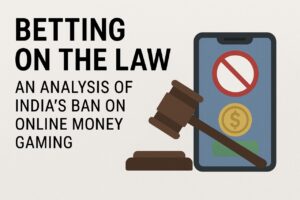Introduction
In today’s digital economy, data is the new fuel. But what happens when a dominant player uses its control over data to tilt the market? That is when competition law steps in. In India, the act that regulates competition is The Competition Act, 2002, and the body is Competition Commission of India (CCI).
The case of WhatsApp’s 2021 privacy policy update is a prime example of this tension between data privacy and antitrust. This blog traces how the Competition Commission of India (CCI) and later the National Company Law Appellate Tribunal (NCLAT) dealt with the issue and to what extent was the harm cured through the orders.
Background – The Spark: WhatsApp’s 2021 Update
In January 2021, WhatsApp announced an updated privacy policy requiring Indian users to accept extensive data-sharing with Meta (formerly Facebook) to continue using the app. The one-click, “accept or leave” format gave users no real choice. Given WhatsApp’s huge user base and its dominance in the relevant market, CCI took suo motu cognizance, suspecting that this update amounted to an abuse of dominance.
Defining the Playing Field: Relevant Markets
The first step in determining the dominance and its abuse is defining the relevant market because it is in this market that the actual competition takes place. CCI identified two:
- OTT Messaging Apps in India: Here, WhatsApp was clearly dominant, with unparalleled daily active users, strong network effects, and high switching costs.
- Online Display Advertising in India: Meta was not dominant on its own, but CCI noted that the data collected by WhatsApp can be used as a leverage to strengthen its position.
This distinction mattered. Dominance in messaging gave WhatsApp the power to impose unfair conditions, and that dominance could be leveraged to reinforce Meta’s advertising business.
The Finding: Abuse of Dominance
The CCI found that WhatsApp and Meta had contravened Section 4 of the Competition Act in three ways:
- S. 4(2)(a)(i) – Unfair conditions in the sale/purchase(usage) of goods or services: forcing users into data sharing as a condition for using the service
- S.4(2)(c) – Denial of market access [in any manner][1]: accumulating unmatched datasets that made it impossible for competitors to compete.
- S. 4(2)(e) – using dominant position in one market to enter or protect, other relevant market: using dominance in messaging to gain an advantage in advertising
The CCI’s Remedies (November 2024)
To correct these harms, the CCI ordered:
- A cease-and-desist from anti-competitive practices.
- A five-year ban on sharing WhatsApp data with Meta for advertising.
- Full transparency on what data is shared and why.
- A penalty of ₹213.14 crore.
This was one of the strongest competition orders against a Big Tech firm in India.
Meta’s Appeal Before NCLAT (January 2025)
Meta and WhatsApp challenged the order. The NCLAT’s decision struck a balance:
- It upheld CCI’s jurisdiction and confirmed abuse of dominance.
- It stayed the five-year ban on advertising data-sharing, reasoning that it has been in practice since 2016 and such blanket ban could lead to the collapse of the business model, also putting the users using its free services at a disadvantage.
- It allowed penalty recovery to be stayed against a 50% deposit, easing the financial burden.
- It maintained all other behavioural remedies: requiring greater transparency in sharing of data for purposes other than advertising and prohibiting coercive terms mandating the users to accept the policy to retain the account.
Thus, the users are no longer forced to accept the privacy policy
Aftermath: Compliance in Practice
Following these directions, WhatsApp introduced an India-specific Privacy Notice (effective July 2025). This notice sets out the categories of data collected, explains how the data may be used, and provides clearer disclosures than before. WhatsApp has materially complied with the directions by enhancing transparency and avoiding the “take-it-or-leave-it” structure that triggered the abuse finding.
Implications
- For Competition: The coercive model that forced users into blanket data sharing is gone. Competitors are not automatically foreclosed from the market because of users compulsorily sharing data.
- For Consumers: Transparency and clarity on data use have improved, giving users a clearer picture of how their information is handled.
- For Meta: The company has complied with the non-stayed obligations by bringing in the India Specific Privacy Notice (effective July 2025) while preserving its business model due to the NCLAT’s stay on the advertising-data ban.
Conclusion: Have the Harms Been Cured?
The most immediate and harmful aspects of WhatsApp’s 2021 update coercion and absence of user choice have been addressed. Users now benefit from transparency and disclosures, and Meta has materially complied with the CCI’s operative directions. The only question still open is whether Meta should be structurally barred from using WhatsApp data for advertising. For now, that issue remains with the NCLAT’s further order.
In sum: the case has reset the baseline. Dominant platforms can no longer impose sweeping data-sharing obligations without scrutiny. The competitive harms have been substantially cured, even as WhatsApp continues to decide the limits of data use in India’s digital economy.
[1] Ins. by Competition (Amendment) Act, 2007.
-By Reecha Sharma
https://www.linkedin.com/in/reecha-sharma-undefined-057b17337



